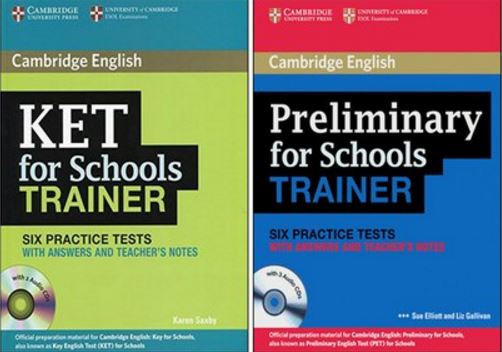Cambridge English: Preliminary for Schools Trainer, KET for Schools Trainer

Both books have a similar layout, with two training and practise exams followed by four more exams. Of course, all of these exams include the reading and writing, listening and speaking sections. Therefore, at first you may think this series is aimed at teachers with exam preparation classes. While they are (and indeed were) useful in this context, I actually think they come into their own as autonomous study books.
Both books begin with a FAQ section, including questions such as “What marks do I need to pass each paper? And to pass the exam?” or “Is KET schools suitable for any age?” Written in a cartoon form using speech bubbles, each question comes with its simple, easy-to-understand answer, which my students found particularly useful, while I found it a good revision for myself, too. Do you know whether answers written in capital letters are accepted or if that will alter the score? I didn’t, and was pleased to find out that no, it doesn’t matter.
The training sections include useful tips that encourage noticing and an advice section that asks useful questions to recycle previous knowledge, look for synonyms, and so on. The training exercises mirror the relevant points of the exams themselves and include sections on “KET/PET candidates often make mistakes with…”. My students particularly liked these little reminders, as they were reassured to see they weren’t the only ones to make mistakes. As such, it was a positive classroom experience to be able to deal with errors without the students feeling ‘named and shamed’.
Although the books could be used as textbooks for an exam preparation class, I kept the books at the back of the class for students to dip into, refer to, and borrow when necessary. My only criticism would be that the series resembles other books on the same subject. However; this is not necessarily a bad thing as the more practise students get, the better prepared and more confident they are having done and dissected several practise exams before the real thing.
Rachael Harris
